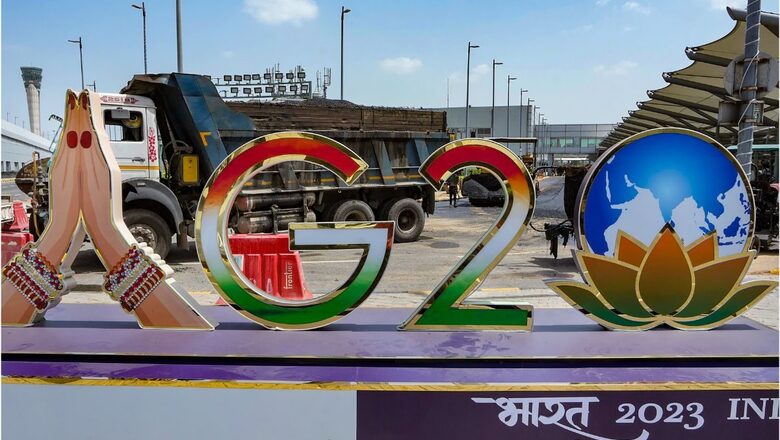
views
Introduction
Global geopolitics faces complex challenges due to climate change and growing energy, food, and health crises, which often accentuate geopolitical concerns. Along with some of these trajectories, the economic recession, the disruption of supply securitisation due to the outbreak of Covid, and the current war in the Slavic geopolitical space between Moscow and Kyiv further aggravate the security challenges. In addition to some of the above problems, one is witnessing that global geopolitics is facing a grave normative crisis.
In this regard, it is pertinent to mention here that though G20 originally came out to address the global economic crisis, some of the core normative concerns that used to have a determinantal role in shaping global issues like Responsibility to Protect (R2P), questions concerning democracy promotion and multipolarity also took centre stage in the successive G20 Summit meetings.
For instance, in the G20 Summit which took place in Brisbane, Australia, 2014, the volatility of the Crimean crisis marred the Summit meeting. This demonstrates that though it is an economic grouping, the global geopolitical questions directly and indirectly shape the outcome of the G20 Summit meetings. In recent years, the Russia-Ukraine war and addressing the socio-economic concerns in the post-pandemic global order are the two critical components of the G20 agenda. The Bali Summit of G20, which took place in 2022, has also discussed the two issues at length but without a consensus. The cohesiveness of the G20 is also being affected by the strategic development of the Indo-Pacific region, where China is disrupting the status quo with its belligerent move. To some extent, the Taiwan crisis also created much uneasiness within the G20. The effectiveness of the G20, to a large extent, is shaped by how pertinent it is in addressing the normative geopolitical questions.
In this context, there is a need to look at how, under India’s leadership, the G20 group can address some of the issues critical to its functioning. In this regard, it is pertinent to underline that India is not only a voice of the Global South but also emerging as a major global power. Historically, India also played a crucial role in addressing the concerns of third-world countries in the post-World War II phase through the Non-Aligned Movement (NAM). Even in the post-Cold War era, India addressed global issues from a humanist perspective in the framework of the Global South. To an extent, this helped India earn enormous goodwill from the international community.
In this background, it is pertinent to address the question of India’s role in addressing the normative questions affecting the G20. This question assumes importance in the context of India’s assumption of the Presidency of G20. As discussed above, this is also a critical phase when this grouping is deeply divided over the Russia-Ukraine fiasco.
India’s Perspective of Global Normative Order
One moot point of India’s contribution to the normative discourses is how to address the question of equity in international relations. It is worth mentioning that Indian foreign policy rejects the notion of hierarchy in the international order. This is one of its cornerstones. During the Cold War period, India enunciated the strategic doctrine of “positive neutrality” under the premise of the NAM. In the post-Cold War era, India outlined the doctrine of strategic engagement to the realms of “strategic autonomy” in foreign policy practices. Despite numerous ups and downs in the international order, India pursues some of these normative idioms in its foreign policy directions. This helps India to play a central role in the global geopolitics.
In this regard, it is worth mentioning that India engages in different multilateral blocs, ranging from Quad, SCO, G20, and BRICS, to ensure a sense of equity in global politics. One may recall that India has also championed the cause of Global South. Its multilateral engagement through the doctrine of “strategic autonomy” provides much manoeuvring space for negotiation and positive engagement in international relations.
The second core normative objective of India’s foreign policy is peaceful co-existence and the need for a just world order. This is one of the cardinal features of India’s foreign policy. One may recall here that at the height of the Cold War rivalry between the two superpowers — the United States and the former Soviet Union — India underlined the need for peaceful coexistence. At the same time, it always stood for a just world order rooted in the philosophy of Panchsheel as well as the doctrine of “Vasudhaiva Kutumbakam” or “One Earth, One Family, One Future.” This is the motto of the G20 Summit under the leadership of India.
In this regard, it is pertinent to mention that both the spiritual philosophy of “Panchsheel” which also enunciates the “middle path” as well as “Vasudhaiva Kutumbakam”, are the only alternatives to the present crisis in the global order. The COVID-19 experience demonstrates how global cooperation is imperative to address a problem of such magnitude. The age-old Indian philosophy of “Vasudhaiva Kutumbakam”, at the same time, also provides a normative model to reform global multilateral bodies, thus making them more legitimate. Similarly, the ongoing Russia-Ukraine War demonstrates the futility of war, and the issue can only be addressed through mediation as envisaged in “Panchsheel”.
Another important area of common concern of the global community is climate change and its repercussions. The Indian philosophy of Panchamahabhuta (five elements of nature — Earth, Water, Fire, Air and Space) will be the right approach to understanding the current problems Panchamahabhuta addresses a balanced development and stresses the interrelationships and significance of five elements of nature that contribute to sustainable development. Similarly, the United Nations and the countries of the Global South have appreciated India’s approach to addressing climatic concerns and developmental issues.
Some of the above-mentioned normative issues relating to India’s foreign policy can also be recontextualised to provide a new normative framework for the functioning of G20. This is more so as India currently provides leadership to the grouping. In this context, one has to look at how India can play a pivotal role in shaping the normative framework of the G20.
India’s Role in Shaping the Normative Framework of G20
Under the leadership of India, the G20 group is addressing a host of issues ranging from global economic restructuring, supply securitisation to digitalisation, etc. In this regard, it is necessary to underline that the priority areas for G20 under India’s leadership, as has been argued by the G20 Development Working Group (DWG), are: “green development, climate finance, women-led development, Lifestyles for Environment (LiFE), data for development, digital transformations, and reform of multilateral institutions”. All these priority areas are closely linked to the normative framework of India’s foreign policy, i.e., “Vasudhaiva Kutumbakam”. In this context, one can argue that a holistic perspective on G20’s vision has been articulated under India’s leadership.
Inclusive Economic Growth and Global Economy
India’s approach has been of an ‘inclusive’ economic growth for the G20 countries and the global economy, which is necessary to address the financial crisis being confronted by the global economy in the post-Covid era. In this context, India highlights the need for supply chain securitisation to ensure balanced economic growth. Because of the slowdown of the global economy, the debt crisis of the countries of the Global South has been aggravated. In this regard, the finance ministers and governors of reserve banks of G20 countries, in their latest meeting in July 2023, have “deliberated on how to strengthen multilateral coordination to effectively address the deteriorating debt situation and facilitate coordinated debt treatment for debt-distressed countries”. The meeting has also “acknowledged the transformative role of Digital Public Infrastructure (DPI) in rapidly advancing financial inclusion and productivity gains.”
Some of the discussions mentioned above can be considered as a step towards “inclusive growth” of the global community and very much rooted in India’s philosophical doctrine as discussed above.
Realising the SDG and Normative Framework of G20
Another area where the present G20 Summit is putting much interest is the Sustainable Development Goal (SDG). In this regard, the SDG provides for inclusive and comprehensive growth for developing countries, addressing concerns relating to climate change, poverty mitigation, health security and ensuring a sustainable energy transition. G20, under its scope of operation, has committed to ensuring that the SDG goals, as enunciated by the United Nations (UN), can be effectively synchronised with the G20 goals. The same has been outlined at the Varanasi Development Ministerial Meeting’s G20 2023 Action Plan to Accelerate Progress on the SDGs. The main issue the meeting highlighted is “promoting individual and collective actions for strategic and targeted policies for equitable, strong, sustainable, balanced and inclusive economic growth to fuel progress towards the SDGs including, by addressing the bottlenecks in financing, especially for developing countries, through international efforts and continuing to improve mobilisation of finance from all sources”.
From the above action plan, it can be inferred that the SDG goals can be realised only through the involvement of multiple stakeholders. In this regard, the G20, under India’s Presidency, has been interested in addressing the developing world’s concerns. This reflects the dynamism of India’s leadership in the G20.
Sustainable Energy Security, Energy Equity and the G20
Another contentious issue that will be discussed at the forthcoming G20 Summit is the question of climate change, energy security and energy transition. The recent war between Russia and Ukraine showed the volatility of the international energy market. The repercussion of the same was felt by both developed and developing countries. In this context, the war has exposed the vulnerability of supply securitisation in energy. Another aspect that must be addressed is ensuring energy storage and smooth energy transition. The problem is further aggravated for the developing countries. Thus, the Summit will address the concerns of the developing countries as well as provide an appropriate forum to discuss the issues relating to clean energy, low-cost finance of energy transition, as well an emphasis on accessing affordable energy.
It may be underlined that India’s approach to energy security, which emphasises inclusive and sustainable energy transition, can be a practical framework to address the energy concerns of the Global South. The International Solar Alliance (ISA) and Green Hydrogen are two significant contributions of India to the global energy transition and can effectively address the global energy crisis. As reported, under India’s initiative, efforts are also being made to provide technological assistance to the Global South countries. Hopefully, the forthcoming G20 Delhi Summit will delve into the issues of finance and technical assistance to the developing countries for global sustainable development.
Membership of the African Union in G20
One of the most interesting aspects of the G20 is that under India’s initiative, the African Union, consisting of 54 African member countries, will join the G20 as permanent members. Before this, only South Africa from the African continent was part of the grouping. In this regard, it can be stated that the African Union is emerging as a major geopolitical frontier in the 21st century. Though this geopolitical space has been rife with a new kind of strategic competition between the US and China. In this context, getting membership in the G20 will allow African countries to take advantage of the collaboration with other countries in various spheres ranging from energy transition to technological collaboration.
Global Geopolitical Crisis and G20 Agenda
One of the most contentious issues influencing the G20 Summit is the shadow of the Russia-Ukraine war affecting global geopolitics. One may recall that this is the most contentious issue in the present context. Western countries who are part of the grouping are pitching for a stronger resolution against Russia in the G20 Declaration. This may create a new challenge for the forthcoming Summit. Achieving a consensus on Ukraine, however, is a distant dream.
In this regard, one may underline that India’s approach to a dialogue between Russia and Ukraine is the only solution to end the war between these Slavic brothers. Similarly, the Taiwan Strait crisis and the aggressive policy of China in the Indo-Pacific region may also sharpen the geopolitical flux of this region. Along with this, the disruption of securitisation of the supply of essential commodities might also shape the geopolitical dynamics of this region. The global economic recession may also shape the geopolitical dynamics, and this issue may receive considerable attention in the forthcoming Summit. Some of these issues will add a new kind of geopolitical dynamism to the functioning of the G20.
Conclusion
India’s normative foreign policy framework provides a blueprint for the G20 to achieve its goals. It is pertinent to highlight that some of the normative goals, like peaceful coexistence, sustainable development, concerns for the Global South, energy transition, and LiFE, are some of the core concerns of India’s foreign policy. Over the years, India has given the Global South a voice in the G20 meetings. India’s age-old normative values can provide a necessary impetus to the functioning of the G20 Summit. This justifies India’s role in global geopolitics as Vishwaguru.
The author teaches at the School of International Studies, JNU, New Delhi. Views expressed in the above piece are personal and solely that of the author. They do not necessarily reflect News18’s views.




















Comments
0 comment